Stay in the know on all smart updates of your favorite topics.
Recap of Demoday #22
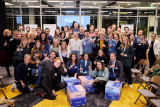
On Thursday December 14th, Amsterdam Smart City partners concluded 2023 with an afternoon full of inspiration, exchange and connections at our 22nd Demoday! Our partner Deloitte welcomed our network in The Garage, where their ‘Deloitte Studios’ department is located. In this article, we’ll give you a quick overview of the Knowledge Session, Work Sessions and Pitches. Interesting in learning more? Read the full reports by our Programme Managers Noor, Pelle and Sophie (linked below).
About our Demodays
The Demodays are one of the tools we use to stimulate innovation and encourage connection between our partners and community. The purpose of the Demodays is to present the progress of various innovation projects, ask for help, share dilemmas and involve more partners to take these projects to the next level. More information about the Demodays can be found here.
Knowledge Session: Change in the here and now, with Theory U
To kick-off our final Demoday of 2023, our brand-new partner Hieroo led an inspiring knowledge session about the change method they use for social innovation in the city: Theory U. Dorien Schneider and Maartje Krijnen taught us more about this methodology and how it can help us solve complex problems by shifting from ego to eco-thinking. Read the full report here.
Work sessions
After the plenary Knowledge Session we split up in different worksessions, each exploring regional innovation challenges. As always, we had set up the sessions’ topics and moderation in collaboration with our partners.
Mobility | Decision-making along the principles of Inclusive Prosperity – Jurhan Kwee (Municipality of Amsterdam)
In The Netherlands, the concept of ‘Inclusive Prosperity’ is on the rise. Policy makers are busy defining this concept, figuring out how to put this concept into practice and what it means for their decision-making process. Together with his colleagues at the Municipality of Amsterdam, Yurhan Kwee hosts sessions on decision-making along the principles of Inclusive Prosperity. With the input he gathers, he hopes to make the decisions needed for our Inclusive Prosperity ambitions more understandable and transparent, both for Amsterdam’s administrators and councillors as well as its citizens. Read Pelle’s recap article here.
Digital | Data Commons Collective: Using data for a liveable city – Lia Hsu (Amsterdam Economic Board) and Simone van der Burg (Waag)
In the big tech-dominated era, data has been commercially exploited for so long that it is now hard to imagine that data sharing might also benefit the community. Yet that is what a collective of businesses, governments, social institutions and residents in Amsterdam aim to do. Sharing more data to better care for the city. On behalf of the Data Commons Collective, Lia Hsu (Strategic Advisor at Amsterdam Economic Board) asked the Amsterdam Smart City network for input and feedback on their Data Commons initiative. Read Sophie's recap article here.
Energy | How can we continue to facilitate the homeowner in driving the energy transition? | Wouter van Rooijen (Alliander)
Wouter van Rooijen (Alliander) discussed the challenges related to grid congestion. From 2030 onwards, it is expected that a significant portion of the low-voltage network will experience both over- and under-voltage. While the network will be reinforced as quickly as possible, the lack of labour capacity is also prompting the consideration of alternative solutions.
The solution that emerged from Wouter's co-creation process was WijkWise. In this work session, Wouter aimed to validate the WijkWise concept and find parties that could contribute to its development and market implementation. Dave van Loon from Kennisland moderated the session. Read Noor’s recap article here.
Circular | Navigating eco-emotions: The impact of working in sustainability on your mental wellbeing| Marian Zandbergen (Hogeschool van Amsterdam)
This work session, led by Marian Zandbergen (CIRCOLLAB, HvA) and moderated by Mareille de Bloois (Royal HaskoningDHV), explored the challenges and opportunities associated with eco-emotions, both personally and within organizations. The key question addressed was: How can individuals and organisations constructively manage eco-emotions, and what implications does this have for organisations? Read Noor’s recap article here.
Pitches
To end this festive afternoon and the year 2023 as a whole, we invited project owners and -members to present their progress and next steps on topics brought in during our events and deep-dives throughout 2023. The following projects were presented. You can read more about these topics on their dedicated articles and project pages, linked below.
Local Energy Systems: Where we started, what we have achieved, and what are the next steps – Omar Shafqat (University of Applied Sciences Amsterdam)
Connecting the resource- and energy transition – Edwin Oskam (MRA)
ChatGPT and the government: Possibilities and impact on our work – Jeroen Silvis (Province of North Holland)
Floating urban districts: Future-proof living in the Metropolitan Region – Joke Dufourmont (AMS Institute)
Mobility Justice: Raising the topic of Mobility Poverty and the working group’s progress – Bas Gerbrandy (Province of North Holland)
Our next Demoday will take place in April. Do you have an inspiring story or project you want to pitch to the Amsterdam Smart City network? Let us know via sophie@amsterdamsmartcity.com
Demoday #20: Knowledge session ‘Power in Transitions’
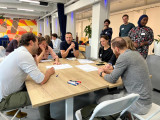
When working together on transitions, it is important to be aware of and sensitive to the impact of power and systemic oppression in participatory processes. Within the Amsterdam Smart City network, the question of inclusion and civic participation, is often brought up in worksessions and discussions. However, we often lack the tools to find the bottlenecks and really include all important beneficiaries.
Therefore, we asked our valued partners Kennisland and DRIFT to lead a workshop about Power in Transitions at Demoday #20 on May 16. Dave van Loon and Faduma Mukhtar (Kennisland) together with Aron Teunissen (DRIFT) taught the participants more about power in transitions, based on the Power Literacy Framework and Field Guide from Kennisland. This guide describes five different forms of power and offers a set of tools for professionals to become more aware of power dynamics in their work.
The five forms of power
According to the Power Literacy Guide by Kennisland, there are five forms of power in design process. If you want to learn more about this, you can download the Power Literacy guide here. The five forms of power are:
Privilege: The type of power you get from a social relation whereby you benefit due to the social group you belong to, at the expense of another social group. It is an unearned advantage and often invisible to those who have it.
Access power: The ability to influence who is included in and excluded from the design project and process.
Goal power: The ability to initiate the design project to begin with, as well as the ability to influence decisions related to framing the problem, goals, and structure of the design process.
Role power: The ability to influence the roles that different stakeholders take on. This includes the ability to assign any roles or titles in the design process, as well as influencing the role each stakeholder plays in making decisions.
Rule power: The ability to influence the way that those in the design process will work together. It includes the ability to influence what is considered normal, what is allowed and what isn’t, how actors will communicate with each other, what language is used, and beliefs about what types of knowledge are valid.
Power check
After a theoretical introduction of the five forms of power, we split into smaller groups to perform a so-called power check for different Amsterdam Smart City projects, such as the Mobility Challenge and “Wat mensen beweegt”. Using this power check, the participants looked at access power and goal power. We identified all actors affected by the project and indicated which actors were not involved. The different actors were then assigned a role in different stages of the process: listener, co-creator, advisor, partner or director.
Most important take-aways
The goal of this exercise was to create more awareness about involving target groups in different stages of the project. The main take-aways were:
The role for the for the ‘benefit group’, the people that are impacted by the project, is often too small. If beneficiaries are involved, this often happens in the last stages of the project. In this phase in the project, it is often more difficult or not possible at all to influence decision-making;
To create equal power, some parties have to ‘give away’ (some of) their power;
Truly inclusive work takes time, effort and money. It is not something takes place overnight;
Awareness is half of the battle: make the topic of systemic oppression in participatory process a structural part of your (work)process).
Want to learn more about power in transitions? Read more.
Transition Day 2023: An integral approach to the circular energy transition
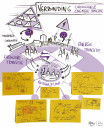
The transition towards a circular economy and the energy transition are both needed to reach a sustainable economy and society. The two are intertwined, as the materials needed for the energy transition (such as solar panels) are enormous and the speed of the energy transition is very dependent on the availability of sustainable raw materials, scarce earth metals and biomass. An integral approach is needed in the Metropolitan Region Amsterdam.
Metropolitan Region Amsterdam (MRA), City of Amsterdam, Province of North Holland (PNH) and Amsterdam Economic Board commit to actively stimulating this integral approach. In the session on the Transition day, we explored what the current connection or disconnection is between the two transitions in order to define the best next step.
Insights of the session
Led by Marielle de Bloois of Royal HaskoningDHV, all participants drew the current situation of both transitions. By explaining our drawings to each other, we all got new insights into the current situation and barriers between the two transitions. The main findings, visualised by Thomas van Daalen of Flatland are:
- There is enormous attention for the energy transition in terms of money, people and communication;
- There is only little attention for circular economy whilst the urgency is nothing less;
- People working on the transitions are working in separate teams with little connection whilst they are working on the same societal challenges;
- The circular economy is unknown and complex. If people want to connect the transitions they don’t know where to start;
- We have to rethink and link our narrative and connect people working on both transition and connect solutions.
The next steps
The session has led us to valuable new insights, and the participants are ready to take the next steps. For now, we have agreed on the following:
- The participants from the municipality of Haarlemmermeer will internally make a connection with their colleagues working on the energy transition.
- Eurofiber will dive deeper into available knowledge within their organisation.
- Edwin from the MRA will take the lead in setting up an approach with Province of North Holland, City of Amsterdam and Amsterdam Economic Board to make sure the topic of the circular energy transition will be part of the MRA agenda 2024.
- Amsterdam Smart City will keep the topic on the agenda and connect the right people around it.
Over Morgen - De toekomst van tankstations
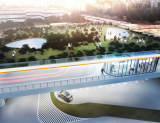
Het speelveld van de energiemarkt voor mobiliteit verandert in snel tempo. Het geloof in de verkoop van diesel en benzine verdwijnt. Gemeenten kunnen voorsorteren op de duurzame mobiele transitie door na te denken over de toekomst van huidige tankstationlocaties.
De vereisten voor het ombouwen van een tankstation tot een laadstation zijn afhankelijk van verschillende factoren, waaronder de grootte en indeling van het tankstation en de elektrische capaciteit van de ligging. Over het algemeen zal een geschikte locatie voor een laadpaal voldoende ruimte moeten bieden voor de minimale vereisten. Eveneens moet de locatie toegang hebben tot een betrouwbare en voldoende elektriciteitsvoorziening, waarvoor mogelijk upgrades van de lokale elektriciteitsinfrastructuur nodig zijn.
Onze two-pager over dit onderwerp lezen? Dat kan via deze link.
Contact over dit onderwerp opnemen? Dat kan via Hidde van der Maas of Anouk Hodemaekers.
Today’s Changemakers #1, Romy Dekker: Using Digital Technologies in The Energy Transition
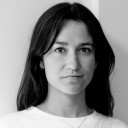
In Today’s Changemakers, we talk with pioneers in our network who are all, in their own way, shaping the city and region of the future. Our first interviewee is Romy Dekker, senior researcher at the Rathenau Instituut. She studied Cultural Anthropology and Development Sociology at Leiden University, where she quickly learned that our societal drive for growth comes at the expense of our planet, and that development does not always mean improvement for all. This insight motivated Romy to combine her interest in science with sustainability. Currently, she works as a senior researcher on topics at the intersection of sustainability, digitalisation and democracy. Her latest work caught our attention. She just started a study on how new technologies, such as Digital Twins, can contribute to tackle societal challenges in the built environment. The following paragraphs describe our insightful conversation about the complexities when using digital technology, her first learnings, and personal ambitions.
In Romy's work, she looks at the role of data and digitalisation in the energy transition in two ways. The first is data as an enabler for a just energy transition.
“The convergence of sustainability transitions and the digitisation of society represents two of the most defining trends of our era. The intersection of these trends has a significant impact on society. The Rathenau Instituut wants to provide tools for a broad discussion about what is needed to use digital technology and data for just sustainability transitions.”
“In our report Stroom van Data, we investigated how data can be used for a just energy transition. It's becoming increasingly clear that data are indispensable for the energy transition. Data can help with keeping the energy system affordable, reliable and clean, for example by better aligning the demand for and supply of energy and by providing citizens insights into their energy behaviour. However, there are also genuine concerns about citizens' control over their data, the cybersecurity of the energy supply, the environmental impact of digital technologies and the distribution of benefits and burdens of a digitalized energy-market. Addressing these issues is necessary to achieve a socially responsible energy transition.”
The second approach concerns how digital technologies, specifically Digital Twins* (definition can be found at the end of this page), can contribute to decision-making regarding spatial planning for sustainability challenges, such as the energy transition. Are Digital Twins merely a hype or a hope?
“Urgent societal challenges are often interdependent, meaning that an intervention in one area can have an impact on another; a decision to build a house somewhere, for example, has an impact on achieving other urgent energy, water, and climate goals. To tackle this complexity and improve the information available to stakeholders, public and private parties turn to data and digital technologies, and more specifically to Digital Twins.”
“However, as digital technologies and data are neither neutral nor apolitical, it is important to remain critical on how Digital Twins can contribute to tackling societal problems. The use of Digital Twins in decision-making and governance may influence our definition and understanding of problems. Consequently, it may determine what is governed, who has the ability to exercise power and be involved, and how we act. Ultimately, this can determine if social challenges are genuinely and fairly addressed. When simulating an urban region, there are also many ecological, social and political-economic aspects. How do you take these factors, which cannot easily be measured, into account?”
“Because the Digital Twin is gaining popularity as a tool for decision-making, the Rathenau Instituut will investigate how such technologies can contribute to tackling societal challenges in the built environment. Can Digital Twins help to make more integral decisions and engage citizens and other relevant stakeholders in decision-making? And if so, how? What are risks associated with using these technologies and how can they be mitigated?”
Romy’s considerations for the Amsterdam Smart City community
“A bit of an open door, but nonetheless very important; technology is a means and not an end in itself. It is important that its use takes place in a responsible manner, with an eye on public values such as equality, fairness, and democratic governance and that it is carefully considered how its use contributes to the urgent societal challenges we face. Finally, public involvement in sustainability transitions is important, but only if it takes place in a meaningful way. Otherwise, it can do more harm than good. This requires a clear answer to questions such as: is it clear what the purpose and process of public participation are and what will be done with the input?”
Using science to tackle societal challenges
“I used to doubt whether I wanted to work as a scientist or not. Because although scientists do very important work, they can sometimes be a bit disconnected from concrete societal issues, causing their work to lose relevance. I like how at the Rathenau Instituut, we really stand between science, politics and society. We want to make scientific insights accessible to a wider audience, and also actively involve citizens through participatory methods. It motivates me that in my work, I’m increasingly looking at how science, technology and innovation can contribute to tackling major societal challenges in a just way.”
“My dream for the urban region of the future? A liveable city for both humans and non-humans that operates within planetary boundaries and ensures an equitable distribution of both burdens and benefits.”
Romy and her colleagues recently started their research on using digital technologies, including Digital Twins, to address societal challenges that come together in a specific (urban or regional) area. Are you currently working on a Digital Twin project, or as a policymaker interested in the use of Digital Twins but facing certain challenges? And would you like to contribute to Romy’s research? Shoot our community manager Sophie (sophie@amsterdamsmartcity.com) a message and she will connect you with Romy!
*A digital twin (DT) can be seen as a virtual representation of a physical product, process or (eco)system. They can be used to simulate how a physical object or system will perform under different conditions and scenarios, allowing for a better understanding and optimization of processes.
Amsterdam Smart City partners aan de slag met drie urgente maatschappelijke challenges
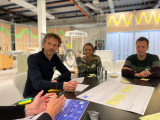
Hoe zet je de mens centraal in digitalisering? Hoe voorkom je uitsluiting van mensen die vervoer niet meer kunnen betalen? Hoe ontwikkel je samen lokale energiesystemen? Amsterdam Smart City werkt met 27 partners in co-creatie aan deze drie belangrijke vraagstukken.
Van digivaardige mensen naar mensvaardige digitalisering
Technologische en innovatieve ontwikkelingen volgen elkaar steeds sneller op. Als overheid wil en moet je hierin meegaan. Tegelijk leidt de inzet van digitalisering en data vaak tot ongewenste resultaten, wat de afstand tussen inwoners/ondernemers en de overheid vergroot.
Gemeente Haarlemmermeer verschuift haar focus van ‘het systeem staat centraal, mensen moeten maar digivaardig worden’ naar ‘de mens staat centraal, onze systemen moeten mensvaardig worden’. De onderliggende vraag is hoe zet je de mens écht centraal in digitalisering en het vormgeven van digitale systemen? De gemeente Haarlemmermeer zou graag samen optrekken om deze vragen uit te werken tot een advies dat breder inzetbaar is.
Mobiliteitsarmoede: hoe voorkomen we uitsluiting van mensen in het mobiliteitssysteem?
Stijgende benzine- en elektriciteitsprijzen; de toenemende digitalisering en afname van het openbaar vervoeraanbod zorgen er, onder andere, voor dat steeds meer mensen problemen hebben om zich te verplaatsen. Verduurzaming en deelmobiliteit lijken niet voor iedereen weggelegd en maatregelen om dit te stimuleren werken het probleem mogelijk zelfs in de hand. Het risico op sociale uitsluiting wordt hierdoor groter.
De provincie Noord-Holland en DRIFT maken zich zorgen over mobiliteitsarmoede en vragen zich af wat we eraan kunnen doen om deze mensen mobiel te houden. Er is echter nog weinig bekend over de omvang van het probleem, de exacte doelgroepen en welk instrumentarium werkt (en wat vooral niet). Daarom willen we graag in gesprek met de partners om tot gezamenlijk inzicht en een afgestemde aanpak te komen.
Samenwerking voor ontwikkeling lokale energiesystemen
De milieuproblematiek en de huidige hoge energieprijzen zorgen voor een snelle omschakeling van gas naar elektriciteit. Dat is de afgelopen jaren veel sneller gegaan dan voorzien, met netcongestie als gevolg.
Door samenwerking tussen lokale partijen kan er een zo optimaal mogelijk energiesysteem gecreëerd worden. Dat kan het elektriciteitsnetwerk ontlasten en, bijvoorbeeld, het maximaal gebruik maken van duurzame bronnen stimuleren en de energiekosten drukken.
Dit vraagt een intensieve samenwerking waarbij elke partij wordt uitgedaagd om verder te denken dan de eigen belangen. Er zijn geen bestaande structuren of systemen waar dit binnen past. Alliander doet een oproep voor samenwerking op dit vraagstuk.
Sinds november werken we in verschillende werkgroepsessies toe naar nieuwe initiatieven om antwoorden te bieden op deze uitdagende kwesties. Wil je ook meedenken en deel uitmaken van oplossingen? Neem contact op met Sophie via sophie@amsterdamsmartcity.com.
Research accelerates the sustainability of heating
AUAS contributes to accelerated roll-out of sustainable low-temperature heating networks in HeatNet project
The international research project HeatNet is all about making heat more sustainable. Less use of natural gas and more use of sustainable heat sources such as the residual heat from data centres. The project aimed to accelerate the roll-out of heating networks in urban areas. And that has been a success! Not only have new heating networks been developed in six European cities, the participating partners have gained knowledge about operating smartly in complex urban transitions. The professors and researcher involved from the Amsterdam University of Applied Sciences (AUAS) talk about the approach and the insights gained.
The role of the AUAS in the research project involves leading evaluations. During six evaluation meetings over three years, the partners reflected on their process of learning from each other and helping each other move forward. Professor of Energy and Innovation, Renée Heller: “As an evaluator, we not only wanted to determine how it went afterwards. But in accordance with the aim of this Interreg project – transnational learning – we embarked on a continuous learning process with each other.”
ON THE SHOULDERS OF GIANTS
This helps the pilot partners gain insights and build on each other’s discoveries. Frank Suurenbroek, professor of Spatial Urban Transformation: “In such complex transition projects, there is so much to consider. This process-based evaluation approach helps you gain insight into the issues you are facing. Such transitions are not a linear process and the insights cannot always be translated directly to other projects. But this approach does make complex processes navigable. It offers pathways for innovation that you can consider.”
The researchers translated this knowledge into various publications and guides, which have been made available to parties dealing with the roll-out of a heating network. Suurenbroek: “The Stakeholder Guide is also interesting for all parties that work on complex urban transitions.” Lecturer-researcher Egbert-Jan van Dijck was responsible for the development of the Stakeholder Guide.
“The heat transition requires an innovation at system level. Therefore, we carried out an extensive stakeholder analysis at meso-level,” explains Van Dijck. “It not only provides an impression of the individuals and organisations involved at the energy sector level, but also of their role in the chain, their interests and concerns. This step towards a situational analysis has enabled us to outline a holistic picture and carry out an in-depth analysis of barriers to the development of the new generation of heating and cooling networks in terms of finance, legislation and regulations and organisation.”
INVOLVING STUDENTS
“We are further expanding this analysis for education.” Van Dijck: Besides the human elements, we also analyse non-human elements, such as buildings, technologies, infrastructure, energy sources and subsurface. These are just as important in determining the situation as the human elements. For example, the pipes for a heating network cannot be laid through a river or a railway track. You need to be aware of these barriers.” Instead of just the people or the stakeholders, students see a much more complete situation at a glance. This goes for fourth-year students as well as second-year students.
Heller: “Several students have used this project for their graduation thesis. Students have even travelled to Ireland on their own initiative to learn more about the energy and heating situation there and to interview partners.”
ROLL-OUT OF HEATING NETWORKS
“There is a lot involved in creating a heating network,” says Heller. “Considering the complexity, it is unusual and significant that all six partners have succeeded in doing so in such a short space of time. It would be a shame not to use the valuable sources of heat available in a country. Data centres, for example, have a huge amount of heat left over. The roll-out of one heating network to multiple heating networks helps us to use available heat sources to increase sustainability and reduce our CO2 emissions.”
INTERDISCIPLINARY AND CROSS-THEMATIC
The HeatNet project is a good example of interdisciplinary collaboration between two research groups with different specialist knowledge. Frank Suurenbroek: “While the implementation of a heating network may appear to be a technical project, it is also an urban transformation process.” Heller adds: “Urban transition involves projects in which taking the energy leap seems the obvious choice, but where there is still little attention for the heat transition, while a great opportunity exists in that respect. Through our collaboration, we have seized that opportunity.”
LEAP blog door DELL!
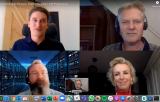
Bij de Amsterdam Economic Board hebben we de rol als ‘transitiemakelaar’; we mobiliseren partijen op onderwerpen om beweging krijgen in een systeem. Soms gaat dat makkelijk als je gelijkgestemden spreekt, soms zijn de belangen net wat anders en moet er meer gebeuren. Zo ook bij het onderwerp waar ik mij nu mee bezig houd – verduurzaming van ICT in datacenters. Dat wat binnen het datacenter afspeelt met dataservers. Je staat er niet bij stil maar het is essentieel voor ieders digitale leventje.
We werken met verschillende partijen samen om met name kennis en bewustwording te creëren om met bestaande mogelijkheden energie te besparen. Ook met grote international hardware leveranciers die een stap maken in het adviseren van klanten waar het gaat om energie-besparen. Dat is namelijk altijd goed.
Daarom zijn we blij dat DELL een podcast heeft opgenomen om hier aandacht voor te vragen, ook ter bewustwording van hun achterban. Bekijk de podcast bij @DellTechNL: https://lnkd.in/dpupEV6
En wat ook leuk is dat we zijn genomineerd voor de #ComputableAwards2020 in de categorie #Duurzaamheid en #MVO. Help ons vooruit door op LEAP te stemmen: https://lnkd.in/dTtb5W5
CyrusOne Announces Partnership to Research Residual Heat Capture at its Amsterdam I facility to Heat 15,000 Homes in Haarlem

The Municipality of Haarlem, SADC’s PolanenPark and CyrusOne Inc. (NASDAQ:CONE), a premier global data center REIT, today announced the signing of a unique Memorandum of Understanding (MoU) to jointly examine the economic and technical feasibility of a heat re-use project in the region. The MoU follows successful collaboration among the three stakeholders over the last 12 months. It is expected to result in the successful capture of residual heat from CyrusOne’s Amsterdam I data center’s water cooling process, which will feed into a new district heating network to heat 15,000 homes in the municipality. If the plan proves feasible, a new agreement to start development will be signed in the first quarter of 2021, with CyrusOne’s Amsterdam I data center expected to provide the very first source of heat.
This MoU was made possible by the alignment and agreement among the data center operator, the landowner and local government. The partnership marries the Municipality of Haarlem’s pledge to become natural gas free by 2040 with CyrusOne’s stated commitment to be a strategic partner for sustainability.
“It is crucial that we build data centers that work in a way that is compatible with a sustainable future. The COVID-19 pandemic has amplified demand for data center capacity, as consumers become more reliant on digital tools for remote working, learning and entertainment,” said Matt Pullen, EVP and Managing Director, Europe, CyrusOne. “The signing of this MoU is a hugely significant progression for the data center industry, and we hope this is the first of many instances in which local government bodies and land owners, such as the Municipality of Haarlem and SADC’s PolanenPark, demonstrate commitment to work together with CyrusOne on similar sustainable projects.”
“The Amsterdam Metropolitan Area applies very strict sustainability conditions for the development of data centers,” said Arnoud van der Wijk, Project Director, PolanenPark. “PolanenPark and Schiphol Trade Park in Hoofddorp, both developments of SADC, are two of the very few locations in the region that meet these conditions. The use of residual heat is one of the important pillars of both concepts of the so-called Green Datacenter Campus. For PolanenPark, I’m proud that we’re doing this together: using a pipeline to take the waste heat to the homes of Meerwijk and thereby making a great contribution to the energy transition. This project is unique for the Netherlands and far beyond.”
“Haarlem is committed to becoming natural gas free by 2040,” said Robbert Berkhout, Alderman of the Municipality of Haarlem. “This means that the municipality must look for alternatives for heating homes and businesses. With the research into the use of residual heat, Haarlem is taking an important step in the development of a heat network in the district.”
FLEXCON2020 Digital edition : registration open
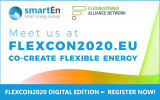
As you may know, we have turned FLEXCON2020 into a digital event.
From September 23 on, we will provide a series of weekly digital FLEXCON2020 tracks, with speakers and sessions all related to a specific Smart Energy topic.
FLEXCON2020 digital edition is free of charge, but registration is required. You can register here: http://bit.ly/FLEXCON2020_reg
Our current planning:
- 23 September 2020 : eMobility, Smart Charging and V2G
- 30 September 2020 : Flexibility markets
- 7 October 2020 : Buildings, Devices & smart technologies
- 14 October 2020 : Industrial & commercial Flexibility
- 21 October 2020 : New concepts in Energy Networks
- 04 November 2020 : Active managed buildings & energy performance contracts
FLEXCON2020 registration:
http://bit.ly/FLEXCON2020_reg
Visit the FLEXCON2020 for more information:
https://flexcon2020.eu/
#SmartEnergy #Sustainability #ElectricVehicles #SmartGrid #DigitalGrid #Blockchain #IoT #SmartHome #SmartCharging
De OD NZKG heeft de gevolgen van het klimaatbeleid voor energietransitie industrie laten onderzoeken
Wat zijn de gevolgen van het Nederlandse klimaatbeleid voor de energietransitie van de industriële bedrijven? In hoeverre raakt de transitie de bestaande bedrijfsprocessen en wat is de rol van de Omgevingsdienst Noordzeekanaalgebied (OD NZKG) in het ondersteunen van energie innovatie in de regio? De OD NZKG heeft de invloed van deze technologische veranderingen op hun werkzaamheden door CE Delft in kaart laten brengen.
Lees het hele onderzoek hier:
https://odnzkg.nl/gevolgen-klimaatbeleid-voor-energietransitie-industrie-onderzocht/
Webinar Series for the CATALYST project
** Converting data centres in energy flexibility ecosystems **
The CATALYST Webinar Series will run for 4 weeks from the 29th July through to the 19th August and cover some exciting topics:
CATALYST aspires to turn data centres into flexible multi-energy hubs, which can sustain investments in renewable energy sources and energy efficiency.
Leveraging on results of past projects, CATALYST has adapted, scaled up, deployed and validated an innovative technological and business framework that enables data centres to offer a range of mutualized energy flexibility services to both electricity and heat grids, while simultaneously increasing their own resiliency to energy supply.
This webinar series provides further information on the:
CATALYST DC Manager (TUC) 29th July @2pm
CATALYST Marketplace (ENG, SiLO, POPs) 5th August @2pm
CATALYST Pilots (PSNC) 12th August @2pm
Green Data Centre Roadmap and Assessment Toolbox (GIT) 19th August @ 2pm
ElaadNL researched 10 Energy Flexibility protocols

ELaadNL has mapped out the functionality, maturity, openness and interoperability of ten Energy Flexibility protocols, like EEBus, openADR, KNX etc.
Download the report in English here:
https://www.elaad.nl/uploads/files/In-Home_Energy_Flexibility_Protocols_-_TKI_Urban_Energy_v1_20200630.pdf
Read the press release (in Dutch) here:
https://www.elaad.nl/news/energieverbruik-beter-sturen-als-apparaten-slim-samenwerken/
#Echonet #EEBus #Spine #EFI #KNX #OCF #OOCP #SEP #openADR #modbus
#FlexibleEnergy
Many home charging points suitable for Smart Charging, also a great challenge
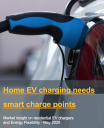
The FAN Foundation has conducted research into home charging points for electric cars. Good news: more and more home charging points are suitable for smart charging. But there is also a great challenge.
Read the news item and download the report:
https://bit.ly/CP_engl
#SmartCharging #EV #SmartGrid
Applications open! Rockstart Energy Program 2020 is starting again
We are looking for startups 🚀
The Energy Program of Rockstart is a domain-focused accelerator-VC with follow-on growth funding. We are looking for startups at the intersection of IT & Energy that contribute to the current energy transition.
Through our Energy Program, Rockstart gives startups access to capital, market, community, and expertise by connecting them to and further working with strategic partners, investors, mentors and our extended network. The top-down, centralized, fossil fuel system is being disrupted by smart, decarbonized, digitalized and decentralized models, offering abundant, clean, renewable, and local energy. We are searching for startups with these energy goals in mind.
Does your startup fit the description? Find out more information on Rockstart’s program and how to apply on our Energy Program website: https://www.rockstart.com/energy/energy-program/
Boardleden in gesprek: de mbo’er is de held van de energietransitie
Boardleden Barbara Baarsma (Rabobank Amsterdam) en Victor Everhardt (Gemeente Amsterdam) in gesprek over de energietransitie.
Wat betekent de coronacrisis voor de energietransitie in de Metropool Amsterdam? Boardleden Barbara Baarsma, directievoorzitter van Rabobank Amsterdam, en Victor Everhardt, wethouder Economische Zaken in Amsterdam, zijn hoopvol gestemd. ‘De energiesector zou weleens dé banenmotor van de regio kunnen worden.’
Lees verder: https://amsterdameconomicboard.com/nieuws/boardleden-in-gesprek-de-mboer-is-de-held-van-de-energietransitie
‘De eco-mode bespaart nog zeven procent energie extra’
De coronacrisis heeft de transitie naar de digitale economie versneld: we werken thuis, bestellen onze boodschappen online en netflixen meer. Dat zorgt ervoor dat er meer data wordt gegenereerd, verstuurd en opgeslagen en dit vraag meer energie. De eerste pilots van ons initiatief LEAP laten zien dat partijen extra energie kunnen besparen door de bestaande eco-mode op hun dataserver beter in te zetten.
Eén van de pilots draaide op het interne datacenter van KPN. Is het echt mogelijk om met meer ambitieuze settings extra energie te besparen zonder in te leveren op de snelheid van de server? Vier medewerkers van KPN vertellen hoe het is verlopen.
Lees verder:
https://amsterdameconomicboard.com/nieuws/eco-mode-bespaart-extra-energie
Deadline for business ideas ClimateLaunchpad postponed till May 17th
ClimateLaunchpad @ AMS Institute is a program aimed to fast-track promising innovative ideas to the next level, by providing knowledge, connections and experience you need to go for that next step. We're looking for young and eager entrepreneurs who want to tackle climate change and make our cities more sustainable.
ClimateLaunchpad @ AMS Institute postpones application deadline till May 17th. And goes digital due to COVID-19 outbreak. Read all about it on our post!
RVO announces European Green Deal call for SMEs
The European Green Deal is the European Commission's strategy for a more sustainable, cleaner and healthier European economy. Research and innovation are of course key to make this happen. RVO (the Dutch agency for subsidies) announces several calls in the coming months of 2020 with a total budget of € 1 billion.
First one on the planning is a special EIC accelerator call for SMEs that need some help to develop a green idea and scale it up internationally. Support will be a subsidy up to € 2,5 million and there is an option for receiving equity up to € 15 million. Projects need to contribute substantially to the European goals for fighting climate change.
Please note that this information is preliminary, more info in Dutch on the website of RVO and we expect that the EU will publish this call in the coming weeks. The RVO-site will update the links to the EC call info, which is not online yet.
Learn more about the smart city with these videos! Edition 2: Energy in the City
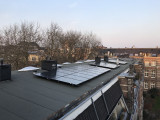
While most of us are working from home in these surreal times, the Amsterdam Smart City team will support you with some inspiration and learnings about the city. We handpicked videos worth watching!
Your agenda might still be full with Zoom videocalls or maybe your helping your neighbours with some groceries. Either way, hopefully these videos will be an inspiration and give you some welcoming new insights. Time to check out videos about the development of the city!
We selected these ones about Energy in the City: recorded in 2019 in Pakhuis De Zwijger, thé dialogue center in Amsterdam. Enjoy!
4 september 2019: AMS Science for the City #6: Energy & Spatial Changes (in English)
The transition towards a low-carbon future is accelerating across all sectors in The Netherlands. But are we doing enough, and are we pursuing the right strategies? How much space does the energy transition require and are we able to accommodate those needs in our densely populated country? What is the spatial impact of this transition on the living environment, in both urban and rural landscapes? The AMS Institute dives into the dynamics and solutions of the sustainable energy transition; and explores its spatial, social and technological questions for the city of Amsterdam, its metropolitan region and the Netherlands as a whole.
[►
AMS Science for the City #6: Energy & Spatial Changes
The transition towards a low-carbon future is accelerating across all sectors in The Netherlands. But are we doing enough, and are we pursuing the right strategies? How much space does the energy transition require and are we able to accommodate those needs in our densely populated country? What is](https://www.youtube.com/watch?v=E24-xb1YNYE)
16 oktober 2019: Amsterdam Smart City – Het Net onder Spanning (in Dutch)
De veranderingen op het gebied van duurzaamheid zijn in volle gang. Elektrische auto’s, warmtepompen en zonnepanelen zorgen ervoor dat we steeds dichterbij en zelfs in huis ons steentje bij kunnen dragen. Deze vernieuwingen doen tegelijkertijd een groot beroep op het elektriciteitsnet in de stad. Om de toenemende vraag naar stroom te kunnen blijven leveren, is meer infrastructuur nodig. Maar ook anders omgaan met ons verbruik en keuzes maken zijn noodzakelijk. Hoe doen we dit? Wat is nodig om vooruit te blijven gaan? En hoe betrekken we bewoners hierbij? Samen met partners van Amsterdam Smart City zoals overheid, bedrijven en bewoners, gaan wij hierover in gesprek. De eerste 10 minuten van de opname missen.
[►
Amsterdam Smart City #5: Het net onder spanning
De eerste 10 minuten van de opname missen, excuses voor het ongemak. De veranderingen op het gebied van duurzaamheid zijn in volle gang. Elektrische auto’s, warmtepompen en zonnepanelen zorgen ervoor dat we steeds dichterbij en zelfs in huis ons steentje bij kunnen dragen. Deze vernieuwingen doen](https://www.youtube.com/watch?v=WZfNqzWDfj8)
18 november 2019: Urban Books #66: Energietransitie als gebiedsontwikkeling (in Dutch)
Hoe kan Nederland een wereldlaboratorium worden voor effectief, duurzaam en participatief realiseren van integrale en complexe opgaven binnen de energietransitie? Met zijn boek ‘Energietransitie als gebiedsontwikkeling’ laat bestuurskundige Peter van Rooy zien hoe Nederland weer tot de top van de wereld kan behoren als het gaat om integrale gebiedsontwikkeling, startend vanuit de energietransitie.
[►
Urban Books #66: Energietransitie als gebiedsontwikkeling
Hoe worden we wereldwijde koplopers van de energietransitie binnen gebiedsontwikkeling? Boekpresentatie Peter van Rooy. De energietransitie is een complexe opgave. Door het toevoegen van windmolens, zonnepanelen, nieuwe infrastructuur, zowel boven- en ondergronds, dreigt ons hooggewaardeerde landsc](https://www.youtube.com/watch?v=lPozVt2jmwg)
23 oktober 2019: Waterstof: dé duurzame energiedrager of niet? (in Dutch)
Volgens de provincie Noord Holland, de stad Amsterdam, de haven en de netwerkbedrijven is waterstof essentieel voor de energietransitie van de regio. Waterstofgas kan een alternatief zijn voor aardgas voor verwarming, zorgen voor verlichting van het overbelaste elektriciteitsnetwerk en of dienen als brandstof voor auto’s; de plannen vliegen je om de oren. Maar hoe realistisch zijn deze plannen en alternatieven? Zijn ze wel écht duurzaam? En waarom hebben we het ineens over 'blauwe waterstof'? In dit programma houden we drie mogelijke toepassingen in de regio – voor de industrie, gebiedsontwikkeling en mobiliteit – kritisch tegen het licht.
[►
De Energietransitie #29: Waterstof: dé duurzame energiedrager of niet?
Volgens de provincie Noord Holland, de stad Amsterdam, de haven en de netwerkbedrijven is waterstof essentieel voor de energietransitie van de regio. Waterstofgas kan een alternatief zijn voor aardgas voor verwarming, zorgen voor verlichting van het overbelaste elektriciteitsnetwerk en of dienen als](https://www.youtube.com/watch?v=1dKEqLtEUlI)
We will add more videos in the next days and collect all of them here. Check out videos about Energy, Circular City, Mobility and Citizens&Living.
The Amsterdam Smart City team loves new insights as well. So, we’re curious… What videos do we have to see? And what articles do we have to read? Share your input in the comments!
Stay up to date
Get notified about new updates, opportunities or events that match your interests.

